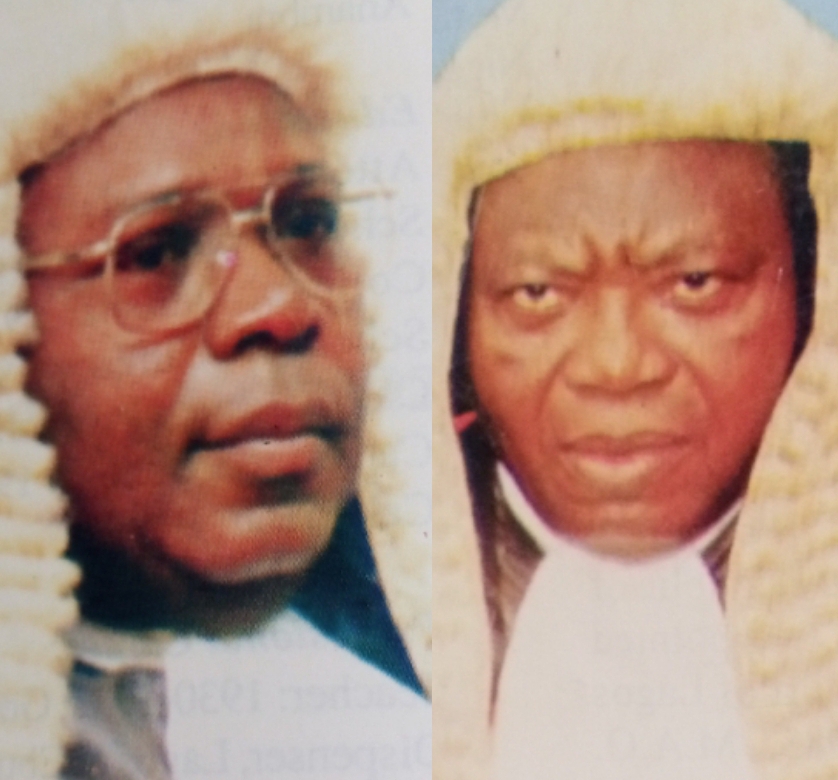By Mustapha Ogunsakin
On June 8, 2023, President Bola Ahmed Tinubu signed into law, the constitutional amendment Bill on uniformity in retirement age of judicial officers’. With that accent, the retirement age of judges in the High Courts was brought to the same level with that of the Justices of the Court of Appeal and the Supreme Court.
However, 24 years earlier, precisely in January 1999, five months before Tinubu became Governor of Lagos State, the issue of the retirement age of judges caused a serious battle between two judges in Lagos State that nearly tore apart the whole Lagos State Judiciary. It pitted the judges against themselves and even senior lawyers of the time were not left behind, as they had to belong to one side of the divide, or the other.
The two dramatis personae, Justice Samuel Omotunde Ilori, and Justice Sikiru Olatunde Adagun both now of blessed memory, were very brilliant judges with both national and international reputation.
Ilori was appointed a judge of the High Court of Lagos State on September 1, 1980, and Chief Judge of Lagos State on December 27, 1996.
His tenure as Chief Judge was a watershed. He was the first Chief judge to introduce electronic recording of court proceedings by introducing Verbatim Court Recording Machines to Lagos judges. However the system recorded little success due to power failure.
The late Justice Ilori was born on January 5, 1934 in Ilesha, Osun State to Chief James Jegede Ilori, and Chief(Mrs) Comfort Olasihunmi Ilori. He attended Holy Trinity School, Omofe, Ilesha (1942-1950). Divisional Teacher Training College (1953-1954), Gloucester Technical College(1956-1959); and University of Leeds, Yorkshire, United Kingdom(1959-1962).

He was at Inner Temple, London(1961-1963), and Nigerian Law School in 1964. He was a teacher briefly, and in private practice before gaining employment as a Pupil Counsel at the Federal Ministry of Justice on July 1, 1965. He transferred his service to Lagos State after the state was created on April 1, 1968. He rose through the ranks in the civil service and was appointed Director of Public Prosecutions(DPP) on March 6, 1978.
As DPP, he prosecuted the case of the popular Lagos socialite, Chief Ejigbadero for the murder of Raji Oba, a farmer in his farm. Ejigbadero was sentenced to death by the late Justice Ishola Oluwa for the murder.
Ilori was promoted as Solicitor-General and Permanent Secretary on June 1, 1979. He was appointed judge September 1, 1980, and Chief Judge of Lagos State on December 27, 1996. He retired on January 5, 1999. He died on October 12, 2021.
Justice Adagun on the other hand had a better part of his career in North East Nigeria. He was born on May 22, 1934. He attended Lagos Government School(1941-1948), Oriwu College, Ikorodu(1949-1950), Ahmadiyya College, Agege(1950-1953), Regent Polytechnic, London (1956-1958), Inner Temple(1959), Council of Legal Education, London(1959-1962), called to the English Bar on February 5, 1963, and Nigerian Law School(April-July 1963).
Adagun was appointed by the Federal Government as a resident Magistrate and seconded to Tanzania(July 1965-1968). When he came back, he was appointed as a Senior Magistrate in Maiduguri, Borno State in 1969, and Chief Magistrate in 1974. He was appointed the first Chief Registrar of Gongola State(now Adamawa and Taraba States) in 1975, and appointed High Court Judge in November 1980. He was transferred to Borno State High Court in 1981. He was Chairman, Ngezerma Riot Panel, Chairman, Recovery of Public Property (Special Military) Tribunal, Kaduna Zone(1986), Chairman Armed Robbery Tribunal, Borno State(1984-1986). He transferred his services from Borno State to Lagos State judiciary in 1991, and was appointed Chief Judge on May 11, 1999, ten days to his birthday and retirement.
It happened that Justice Ilori was already preparing for his retirement when a controversy broke out over the extension of the retirement age of Chief Judges of states in the Country. At that time, the Federal Government had already extended the retirement age of Appellate Court Justices to 70 years. Ilori was to retire on January 5, his birthday. On December 31, 1998, he gathered judicial reporters to his court where he bid them farewell. Justice Ilori was very cordial with the media. However in his new year speech the following morning, the then military Head of State, Gen Abdusalami Abubakar announced the extension of the retirement age of Chief Judges from 65 to 70 years. All hell broke loose! By that statement, Ilori’s tenure had just been extended!
This immediately pitted judges of Lagos State origin against their brothers who were not indigenes. Personally it meant that the hope of Justice Adagun, who was already waiting for his turn, although only five months, to become Chief Judge had been dashed.
With the announcement of the Head of State, Justice Ilori truly attempted to defer his retirement. But some Lagos indigenous judges would not have it. A politician and former Minister in the First Republic, Chief Theophilus Benson SAN swiftly filed an ex-parte application before Justice Eniola Longe at the Ikeja High Court, seeking to compel Justice Ilori to proceed on retirement. This was resisted by Justice Ilori who engaged the doyen of Nigerian Bar, Chief FRA Williams SAN as his lawyer. Despite all his objections, Justice Longe granted the application. Williams immediately proceeded to the Court of Appeal to challenge Justice Longe’s order.
In the interim, Ilori could not continue to occupy the office of Chief Judge due to Justice Longe’s order despite appeal. Adagun too could not assume office of Chief Judge. It got to a point that both judges met at the judges verandah and engaged themselves in fisticuffs. It took workers and other judges around to separate them.
The controversy became so heated that Gen Abdulsalami Abubakar had to withdraw the extension. Rumours however had it that the extension was not part of the Head of State’s speech originally. It was alleged that it was smuggled into the speech.
The Court of Appeal eventually quashed Justice Longe’s order. With the withdrawal of the extension, the coast became clear for the swearing in of Justice Adagun as a substantive Chief Judge which was only ten days away from his birthday and retirement. His tenure as Chief Judge remains the shortest in the history of Lagos State.
Dear readers, we really need your support to keep on serving you with authoritative, truthful, and juicy stories everyday. For your support, please reach out to the editor @gavelinternational66@gmail.com

